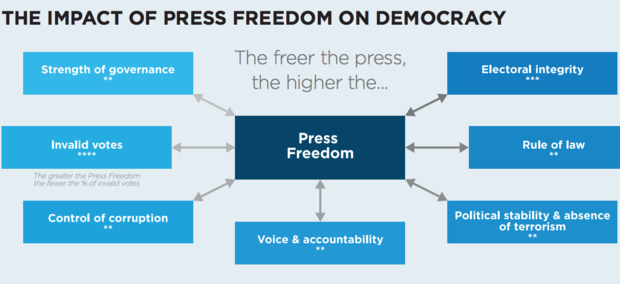By Dr. Francois Nell and Dr. Coral Milburn-Curtis
When World Press Trends was first published three decades ago, liberal democracy was on the march and press freedom was on the rise.
The Berlin Wall was down, the Cold War between Russia and the USA was ending, the apartheid regime in South Africa was teetering and even though the Chinese government had brutally put down a democratic movement, it was possible to imagine that an increasingly educated and prosperous middle class would eventually (and successfully) demand democratic reforms.
The world is very different today, notes William Galston, a former foreign policy advisor to US President Bill Clinton and now at the Brookings Institution, a public policy think-tank in Washington, DC. Not only does liberal democracy face multiple external challenges from a variety of autocratic regimes but also significant internal challenges from populists who seek to drive a wedge between democracy and liberalism. “Liberal norms and policies, they claim, weaken democracy and harm people,” Galston notes. “Thus, liberal institutions that prevent people from acting democratically in their own interest should be set aside.”
In 2019 the control of the press is, once again, a key battleground in every corner of the globe, from the Americas to Asia Pacific. The struggle takes many forms and is fought on many fronts. Some tactics are covert, such as smear campaigns and trolling bent at undermining the credibility of journalists and critical news organisations. Others are overt, such as restrictive laws, ownership by government puppets, intimidation and, increasingly, violence. How this worldwide battle for press freedom turns out is important, if uncertain.
So it is that in 2019 we quantify for the first time the role a free press plays not only for the health of liberal democracies but also for the wealth of nations and the well-being of societies. Press Freedom in this study draws on the definition of Freedom House, which takes it to comprise a variety of factors, including: freedom of speech; effective press laws; freedom of information legislation; and editorial autonomy.
Democracy has been described by the United Nations as “a universal value based on the freely expressed will of people to determine their political, economic, social and cultural systems and their full participation in all aspects of their lives.” The health of a democracy is measured by a variety of indicators including access to information, freedom of association and of peaceful assembly, and electoral integrity.
The statistical evidence we present here relies on more than 200,000 data points drawn from across a range of widely respected sources – including the World Bank, United Nations, OECD12 and more. Whilst correlations don’t necessarily imply causal relationships and the links between all these variables are complex, our multivariate analysis shows there is no doubt that the robustness of a free, independent news media industry is strongly linked to the wealth of nations and the health of its people – and that matters to everyone, inside and outside of the news media industry.
Download the World Press Trends Executive Summary and Extract - PRESS FREEDOM: A free press contributes to the wealth of nations and the well-being of societies.




